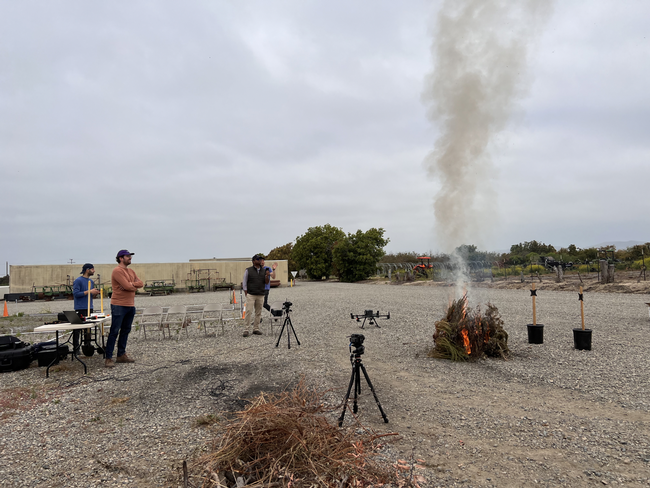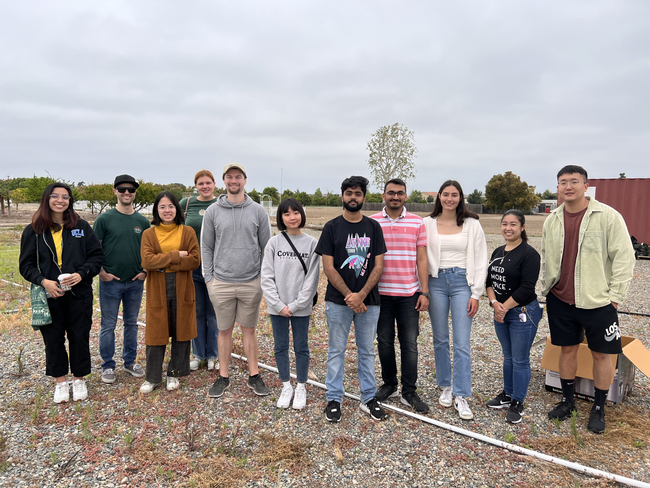- Author: Saoimanu Sope
Although training is required to become a University of California Master Gardener, the benefits of gardening can be experienced by anyone and everyone.
“As long as you're willing to get your hands dirty,” said Laurie Menosky, a UC Master Gardener volunteer in Orange County, “you can learn to grow all sorts of things.”
In early April, Menosky partnered with ETN Medical Infusion (a clinic in Orange County) and the Sustainability Program for Student Housing at UC Irvine to teach students how to grow tomatoes. Menosky welcomed all in attendance, including families with toddlers who seemed fascinated by the 60 tomato plants atop one of the tables in the room.
The UC Master Gardener Program is a part of UC Agriculture and Natural Resources. During her presentation, Menosky taught participants how to choose varieties that fit their taste and growing environment, how to cultivate a thriving environment, and how to control pests and diseases using integrated pest management practices.
“We have 16,000 residents at UCI and sustainability is one of our values. One of the ways we engage students is through on-campus gardens,” said Rachel Harvey, sustainability program manager for UCI Student Housing and a UC Master Gardener volunteer in Orange County.
UC Irvine has one teaching garden reserved for undergraduate learning, and three gardens operated and maintained by graduate students. “I was on the waiting list for a garden plot for a while, but it was totally worth the wait,” said Johanna Rinaman, a fifth-year Ph.D. student studying physical chemistry.
While the highlight of the event for many people was the opportunity to take a tomato plant home, another important takeaway was how gardening can be a good activity for your mental health. Sarah Nghiem, family medicine specialist at ETN Medical Infusion, who worked closely with Menosky, was instrumental in developing the mental health content for the day, encouraging attendees to attempt gardening with a mental health perspective.
Nghiem and her team received funding from the Orange County Health Care Agency through the Mental Health Services Act to work with transitional aged students (15-24 years-old) on understanding the importance of mental health, which led to the collaboration between UC Irvine, her alma mater, and the UC Master Gardeners of Orange County.
“I didn't do any gardening during the winter, and I felt a lot more anxious and depressed during that time,” Rinaman said. “I know gardening improves mental health because I've immediately felt a difference whenever I spend time with plants.”
Rinaman, whose father taught her a lot of what she knows about gardening, said that having access to a 4 feet by 6 feet plot to grow her own food is one of the many things she loves about UC Irvine.
Like Rinaman, Menosky turns to gardening to decompress, especially during the long days of summer. Teaching others about the physical and mental benefits of gardening gives her an opportunity to share her experience and, hopefully, help others find new ways to manage stress.
“We often have attendees come back years later telling us how our information has helped them and how much more they are enjoying their time in their gardens,” she said.
To conclude her presentation, Menosky instructed participants to line up for their own tomato plant. Attendees took their plants outside to transfer them from a small pot to a grow bag – a type of container that helps root structure development.
Cassie Ekwego, a third-year transfer student studying civil engineering, couldn't hide her excitement after carefully lifting her plant. “I don't think I realized how attentive you need to be when working with plants,” said Ekwego, reflecting on what she learned from Menosky's presentation.
Now that she has her own plant to care for in her own home, Ekwego is eager to put her new knowledge to the test. “I love tomatoes, but this is going to be a huge responsibility for me,” she said.
Randy Musser, UC Master Gardener program coordinator for Orange County, said that while he enjoys talking to avid gardeners, bringing gardening to new people in the community is special to him. “This tomato workshop is particularly exciting for me because it is an opportunity for the UC Master Gardeners to grow our connection to UCI and young people just starting off on their gardening journey,” said Musser.
With a generous contribution from UC Master Gardener volunteer Sheila Peterson, Musser was able to purchase enough supplies to help attendees, like Ekwego, jumpstart their gardening experience.
Students, whose stress levels can skyrocket throughout the school year, value opportunities to be outdoors, try something new and be in community. “The garden is a different type of classroom. It's a place where students can learn and experiment, hopefully in a way that reduces stress,” said Harvey of UCI Student Housing.
Ekwego, who tried gardening for the first time while volunteering at UC Irvine's teaching garden, is just one of the many students inspired by their experiences. “Gardening reminds me that it's OK to get my hands dirty,” Ekwego said.
- Author: Saoimanu Sope
Besides starting fires for the sake of research, Luca Carmignani, UC Cooperative Extension fire advisor for San Diego, Orange, Los Angeles, and Riverside counties, has started leveraging his connection to local UC campuses by providing opportunities for hands-on learning.
Early one morning in May, students and staff from UC Irvine and UC Riverside gathered at the South Coast Research and Extension Center to collect data for their own research projects. South Coast REC, located in Irvine, is part of a statewide network of research and education facilities operated by UC Agriculture and Natural Resources.
In one area of the field, graduate students picked leaves and twigs from dried shrubs, carefully placing them in a device that measures moisture content. In another area, a postdoctoral scholar set up a device that records levels of particulate matter, carbon dioxide and other air pollutants emitted by a fire.
Tirtha Banerjee, professor in the Department of Civil and Environmental Engineering at UC Irvine, coordinated the field day with Carmignani. The two first connected as members of iFireNet, an international network of networks that connect people to fire research, when Carmignani was a postdoctoral researcher at UC Berkeley.
Now, the two are collaborating to help environmental science and engineering students realize the potential of their research interests.
Jacquelynn Nguyen, a Ph.D. student in the Civil and Environmental Engineering department at UC Irvine, is interested in understanding how ash from wildfires and prescribed burns can be used as a treatment for per- and polyfluorinated substances. PFAS are a group of “forever chemicals” that can be found in heat-resistant materials – including fire extinguisher foam – and are extremely difficult to eliminate.
Before Nguyen could collect her ash samples, Carmignani needed to cautiously set the dried shrubs on fire, providing a realistic situation for data collection purposes.
“We're trying to figure out if the ashes from these fires can be used as activated carbon, which could be used as a treatment for PFAS,” said Nguyen. “We want to see if this treatment can basically absorb PFAS and prevent it from traveling into soil and groundwater.”
While Nguyen is concerned about the impact that wildfires have on the land, Soroush Neyestani, a postdoctoral scholar in the Environmental Sciences department at UC Riverside, is interested in its impact on the air quality.
During a fire, it's difficult to determine how much emissions are a result of flames versus smoldering, the process of burning slowly with smoke but no flames, and current air quality models do not provide accurate guidance on this matter. Using an air quality sensor, Neyestani wants to quantify the difference in emission levels during the two phases.
“There are assumptions that 50% of emissions come from smoldering, but every fire is different. Our main objective is to improve the accuracy of air-quality forecasting,” Neyestani said, noting his concern that these assumptions might not be realistic.
Although the field day was created with the students in mind, Carmignani used the opportunity to polish his own research efforts. Since fall 2022, he has been investigating the flammability of low-water use landscape plants based on various irrigation applications.
“Every time we burn, I feel like we get better. We get better data, and we conduct better analysis, and that's really important for us so that we can figure out how we can apply our research and measure its outcome,” said Carmignani.
In addition to welcoming more collaborations with UC campuses and other organizations, Carmignani is hopeful that these combined research efforts will spark an interest in wildfire awareness everywhere.










